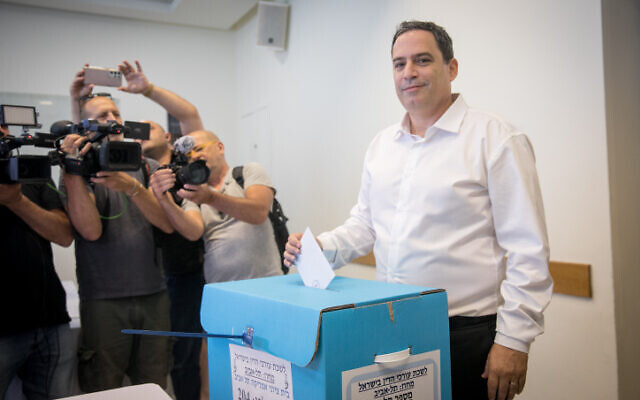In blow to coalition, anti-overhaul Becher expected to win Bar Association vote
Government’s preferred candidate Nave admits defeat; results seen as crucial in larger fight over Judicial Selection Committee and effort to curb High Court’s powers

Efi Nave, the government’s favored candidate for the chairmanship of the Israel Bar Association (IBA), acknowledged Wednesday morning that he had likely lost the election, as partial results showed his opponent Amit Becher, a staunch opponent of the government’s judicial overhaul plan, holding a significant advantage.
Partial results from several districts were reported by Hebrew media outlets, indicating that Becher, the interim IBA chair, was expected to win by a comfortable margin over former IBA chairman Nave.
In the IBA’s northern district, Becher reportedly received some 1,500 votes while Nave only won around 250. In the Jerusalem district, reports said Becher had bagged 2,559 votes to Nave’s 1,393. And in the southern district, considered a bastion of support for Nave, the vote count was neck and neck with some 1,250 votes for Becher and around 1,225 for Nave.
The remaining districts included the Tel Aviv district — the largest, and expected to heavily favor Becher — the Haifa district, where initial reports said Becher was ahead, and the central district, for which there was no immediate data available.
The two other candidates — Doron Barzilai, also a former IBA chairman, and Arkady Eligulashvili — received little support.
The election, usually of little national interest, took on particular significance this time since the Bar Association’s National Council selects two representatives from the IBA to sit on the Judicial Selection Committee, which appoints judges to all courts in Israel and is at the center of the government’s push to overhaul the judiciary.
Becher’s likely win means two opponents of the government plan will likely be picked as committee members, preventing the government from securing control of the panel in its current form — and increasing its motivation to remake the committee entirely. Legislation to do so has already passed most Knesset hurdles and could be passed within days, but faced massive public pushback when it was on the table in March and would likely lead to large-scale protests if passed now.

Overall turnout in Tuesday’s elections was some 50 percent of the 77,000 eligible voters, a huge increase over the 28% who voted in the last elections in 2019.
“The battle became a war between left and right, which was not in my favor, and the professional agenda of the bureau was ignored,” Nave told the Kan public broadcaster Wednesday morning.
“In such battles, the right always loses. I did not come with a political agenda but with a professional one. I was one of the best heads of the bureau,” he argued.
Nave was widely seen as sympathetic to the current right-wing government and has stated that he was in favor of legal reform in general, although he has insisted he did not support all of Justice Minister Yariv Levin’s radical reform package.
Regardless, Nave was backed by senior coalition figures and government allies and was seen as likely to cooperate with Levin.

Nave was convicted last year of border fraud for smuggling his partner through passport control at Ben Gurion Airport in 2018 in order to avoid entanglements in the divorce proceedings he was involved in with his wife at the time.
And in 2019, Nave was arrested on suspicion of advancing the judicial appointments of women in return for sexual favors. The State Attorney’s Office eventually declined to prosecute Nave, since key evidence against him was obtained by illegally hacking his phone and was likely to be thrown out by the court.
Becher, who has campaigned fiercely against the government’s judicial overhaul legislation, told Army Radio he believed he had won the race, adding that he would “fight to restore the honor of the IBA and protect the independence of the legal system.”
The two Bar Association representatives on the Judicial Selection Committee will join the seven other members of the panel: two government ministers, two lawmakers (one of whom is from the opposition — Yesh Atid MK Karine Elharrar), and three Supreme Court judges.

If the Bar Association representatives will indeed be hostile to Levin’s overhaul plans, he will likely refuse to convene the committee in the short term, and it also may spur him to revive the bill to hand governing coalitions almost complete control over all judicial appointments in the country.
Indeed, an unnamed senior coalition source quoted by the Maariv news site said Wednesday that the results had ensured the government will change the makeup of the Judicial Selection Committee to remove the Bar Association representatives, and that if that is not done, “this government has no right to exist.”
“The Bar Association committed collective suicide,” the source was quoted as saying. “What will happen is that the IBA will quickly stop being an organization with significance and influence.”









